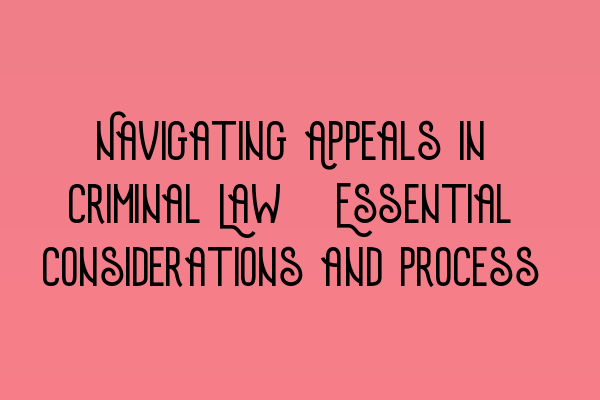Navigating Appeals in Criminal Law: Essential Considerations and Process
Welcome to SQE Criminal Law & Practice Law UK! In this blog post, we will explore the intricate process of navigating appeals in criminal law. Facing an appeal can be a daunting experience, but with the right knowledge and guidance, you can effectively navigate the complexities of the system.
The Importance of Appeals
Before delving into the details, let’s understand why appeals are crucial in criminal law. An appeal allows a defendant or prosecution to challenge a previous court’s decision. It serves as a fundamental mechanism for safeguarding justice and correcting errors or miscarriages of justice.
At SQE Criminal Law & Practice Law UK, we believe in providing comprehensive support to legal professionals like you. If you’re looking to expand your expertise, consider attending our workshops and seminars on criminal practice. These events offer valuable insights and practical knowledge to enhance your skills.
The Appeals Process: Step by Step
1. Grounds for Appeal: Understanding the grounds for appeal is crucial. Common grounds include errors in law, new evidence, ineffective counsel, or procedural irregularities. It’s essential to identify the specific grounds applicable to your case.
2. Filing the Notice of Appeal: Once you have identified the grounds, the next step is filing a Notice of Appeal. This formal document notifies the relevant court and parties involved that you wish to challenge the decision. It’s important to ensure the notice is filed within the prescribed timeframe.
3. Case Review and Preparation: After filing the Notice of Appeal, thorough review and preparation of the case are necessary. This includes gathering all relevant documents, transcripts, and evidence to support your appeal. Seek expert legal advice for a comprehensive analysis of your case and potential arguments.
If you’re seeking updates on UK criminal laws to stay informed and prepared, our article on updates in UK criminal laws provides valuable information to sharpen your knowledge.
4. Submitting the Appellant’s Notice: The Appellant’s Notice is a detailed document outlining the grounds for appeal and the legal arguments supporting it. It’s crucial to draft the notice carefully and articulate your position effectively. A well-crafted Appellant’s Notice significantly strengthens your chances of success.
5. Court Hearings and Proceedings: Once the notice is submitted, the appeal progresses to court hearings and proceedings. These hearings provide an opportunity for both parties to present their arguments and evidence. It’s essential to be well-prepared, confident, and persuasive in presenting your case.
To enhance your SQE Criminal Law study group experience, check out our article on enhancing your SQE Criminal Law study group experience. It offers valuable tips to maximize your learning and collaboration with fellow students.
6. Court’s Decision: After the hearings, the court will deliver its decision. The court can uphold the previous decision, reverse it, or order a retrial. Understanding the potential outcomes helps you prepare for the next steps.
Seeking Professional Guidance
Navigating appeals in criminal law requires in-depth knowledge, expertise, and attention to detail. Engaging the services of an experienced criminal defense solicitor is essential to increase your chances of success.
If you require a detailed analysis of criminal evidence rules, our article on decoding criminal evidence rules provides valuable insights to aid your understanding and application of these rules.
At SQE Criminal Law & Practice Law UK, our team of skilled solicitors specializes in criminal law and appeals. We stay up-to-date with the latest legal developments and have a proven track record of success in handling appeals.
If you’re involved in a complex appeal case, particularly related to fraud and financial crimes, our article on fraud and financial crimes provides a comprehensive overview that can help you navigate the intricacies of such cases.
Contact us today to schedule a consultation. Our solicitors will guide you through the appeals process, analyze your case, and provide strategic advice to achieve the best possible outcome.
In Conclusion
Navigating appeals in criminal law is a complex process. Understanding the essential considerations and following the proper steps is crucial for success. By leveraging the expertise of skilled solicitors and staying informed about the latest legal developments, you can effectively navigate the appeals process.
Remember to explore our other articles on criminal practice, enhancing your study group experience, and staying updated with UK criminal laws to broaden your knowledge and expertise.
Disclaimer: This blog post is intended for informational purposes only and does not constitute legal advice. Please consult a professional solicitor for personalized guidance.
